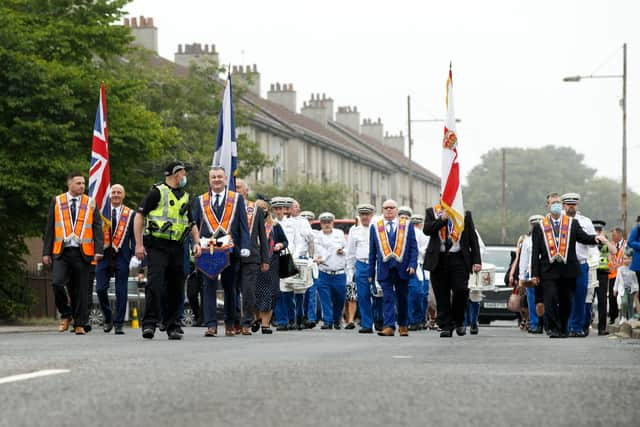SNP accused of 14 years of 'occasional outrage and no action' on sectarianism
This article contains affiliate links. We may earn a small commission on items purchased through this article, but that does not affect our editorial judgement.
Criticising the “occasional outrage followed by no action” of the Scottish Government since the SNP came to power in 2007, the Labour politician called on Nicola Sturgeon to do more to tackle religious hatred.
The comments, published in The Times, come a day after Police Scotland made several arrests following reports of “racist and sectarian singing” during Orange Order marches in Glasgow.
Advertisement
Hide AdAdvertisement
Hide Ad

Thousands of people took part in processions which shut down city centre roads and prompted counter-protests, with around 800 police officers deployed to manage the marches which passed through city centre streets and past Catholic churches.
Lord McConnell, who labelled sectarianism Scotland’s “secret shame” in a speech in 2002, claimed progress tackling sectarianism had been “reversed” by his successors Alex Salmond and Nicola Sturgeon.
During his time as First Minister, Lord McConnell set up ‘summits’ involving representatives from football clubs such as Celtic and Rangers, as well as the Catholic Church, the Church of Scotland, and the Orange Order.
He said: “Those who say there is no problem of sectarianism or religious hatred in Scotland need to take their heads out the sand.
“I am really disappointed that the progress we were making between 2002 and 2007 was reversed by my successors. We had the churches, schools, employers, police and football clubs all working together. I tried to respect everyone involved, but engage them in change.
“The action plans, particularly those at Rangers and Celtic, were making a real difference. Leadership directed at cultural change was working.
"From joint-campus schools to agreements on marches and parades, common sense and decency was winning. But 14 years of occasional outrage followed by no action have allowed this cancer to grow again.”
Lord McConnell called on the First Minister to take action now to tackle sectarianism and reconvene the summits.
Advertisement
Hide AdAdvertisement
Hide AdThe Labour peer has made similar calls in the past, including in 2019 after violent clashes in Govan following an Irish unity march.
He said: “Those who have power, at all levels, must use their power to attack the culture of fear and hatred. The First Minister must reconvene the summits, demand action in football, parades and other areas that divide us, and unite Scotland to say ‘no more’ together.
“To achieve that, leaders must engage with all sides and be prepared to stay engaged over the long term to root it out properly.”
Following the marches in Glasgow on Saturday, which saw 32 roads closed and crowds lining the streets, chief superintendent Mark Sutherland, divisional commander for Greater Glasgow at Police Scotland, condemned the singing of sectarian songs.
He said: “Once again, we see a number of people intent in causing offence and stirring up hatred by singing unacceptable sectarian and racist songs, I want to again condemn this behaviour in the strongest possible terms.
"It is clear that sectarianism remains a serious, ongoing problem in Scotland and whilst policing has an important role in tackling this type of behaviour, this is a collective problem and needs to be addressed in a collective, collaborative manner.”
A message from the Editor:
Thank you for reading this article. We're more reliant on your support than ever as the shift in consumer habits brought about by coronavirus impacts our advertisers.
If you haven't already, please consider supporting our trusted, fact-checked journalism by taking out a digital subscription.
Comments
Want to join the conversation? Please or to comment on this article.
